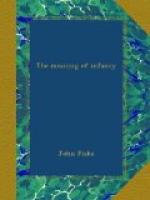But this period of helplessness has to be viewed under another aspect. It is a period of plasticity. The creature’s career is no longer exclusively determined by heredity. There is a period after birth when its character can be slightly modified by what happens to it after birth, that is, by its experience as an individual. It becomes educable. It is no longer necessary for each generation to be exactly like that which has preceded. A door is opened through which the capacity for progress can enter. Horses and dogs, bears and elephants, parrots and monkeys, are all teachable to some extent, and we have even heard of a learned pig. Of learned asses there has been no lack in the world.
But this educability of the higher mammals and birds is after all quite limited. By the beginnings of infancy the door for progressiveness was set ajar, but it was not all at once thrown wide open. Conservatism stilt continued in fashion. One generation of cattle is much like another. It would be easy for foxes to learn to climb frees, and many a fox might have saved his life by doing so; yet quickwitted as he is, this obvious device never seems to have occurred to Reynard. Among slightly teachable mammals, however, there is one group more teachable than the rest. Monkeys, with their greater power of handling things, have also more inquisitiveness and more capacity for sustained attention than any other mammals; and the higher apes are fertile in varied resources. The orang-outang and gorilla are for this reason dreaded by other animals, and roam the undisputed lords of their native forests. They have probably approached the critical point where variations in intelligence, always important, have come to be supremely important, so as to be seized by natural selection in preference to variations in physical constitution. At some remote epoch of the past—we cannot say just when or how—our half-human forefathers reached and passed this critical point, and forthwith their varied struggles began age after age to result in the preservation of bigger and better brains, while the rest of their bodies changed but little. This particular work of natural selection must have gone on for an enormous length of time, and as its result we see that while man remains anatomically much like an ape, be has acquired a vastly greater brain with all that this implies. Zoologically the distance is small between man and the chimpanzee; psychologically it has become so great as to be immeasurable.
But this steady increase of intelligence, as our forefathers began to become human, carried with it a steady prolongation of infancy. As mental life became more complex and various, as the things to be learned kept ever multiplying, less and less could be done before birth, more and more must be left to be done in the earlier years of life. So instead of being born with a few simple capacities thoroughly organized, man came at last to be born with the germs of many complex




